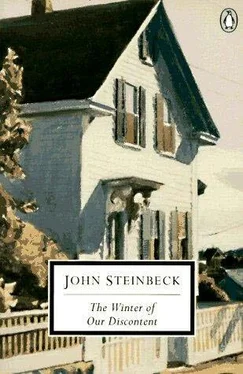The broom traced a delicate curve against the pavement. “It’s this way, sir. That money is Mary’s temporary security if anything should happen to me.”
“Then you should use part of it to insure your life.”
“But it’s only temporary, sir. That money was Mary’s brother’s estate. Her mother is still living. She may live many years.”
“I understand. Old people can be a burden.”
“They can also sit on their money.” Ethan glanced at Mr. Baker’s face as he said his lie, and he saw a trace of color rise out of the banker’s collar. “You see, sir, if I invested Mary’s money I might lose it, the way I lost my own, the way my father lost the pot.”
“Water under the bridge, Ethan—water under the bridge. I know you got burned. But times are changing, new opportunities opening up.”
“I had my opportunity, Mr. Baker, more opportunity than good sense. Don’t forget I owned this store right after the war. Had to sell half a block of real estate to stock it—the last of our business property.”
“I know, Ethan. I’m your banker. Know your business the way your doctor knows your pulse.”
“Sure you know. Took me less than two years to damn near go bankrupt. Had to sell everything but my house to pay my debts.”
“You can’t take all the blame for that. Fresh out of the Army—no business experience. And don’t forget you ran smack into a depression, only we called it recession. Some pretty seasoned businessmen went under.”
“I went under all right. It’s the first time in history a Hawley was ever a clerk in a guinea grocery.”
“Now that’s what I don’t understand, Ethan. Anybody can go broke. What I don’t see is why you stay broke, a man of your family and background and education. It doesn’t have to be permanent unless your blood has lost its guts. What knocked you out, Ethan? What kept you knocked out?”
Ethan started an angry retort—Course you don’t understand; you’ve never had it—and then he swept a small circle of gum wrappers and cigarette butts into a pyramid and moved the pyramid toward the gutter. “Men don’t get knocked out, or I mean they can fight back against big things. What kills them is erosion; they get nudged into failure. They get slowly scared. I’m scared. Long Island Lighting Company might turn off the lights. My wife needs clothes. My children—shoes and fun. And suppose they can’t get an education? And the monthly bills and the doctor and teeth and a tonsillectomy, and beyond that suppose I get sick and can’t sweep this goddam sidewalk? Course you don’t understand. It’s slow. It rots out your guts. I can’t think beyond next month’s payment on the refrigerator. I hate my job and I’m scared I’ll lose it. How could you understand that?”
“How about Mary’s mother?”
“I told you. She sits on it. She’ll die sitting on it.”
“I didn’t know. I thought Mary came from a poor family. But I know when you’re sick you need medicine or maybe an operation or maybe a shock. Our people were daring men. You know it. They didn’t let themselves get nibbled to death. And now times are changing. There are opportunities our ancestors never dreamed of. And they’re being picked up by foreigners. Foreigners are taking us over. Wake up, Ethan.”
“And how about the refrigerator?”
“Let it go if you have to.”
“And how about Mary and the children?”
“Forget them for a while. They’ll like you better if you climb out of the hole. You’re not helping them by worrying about them.”
“And Mary’s money?”
“Lose it if you have to but risk it. With care and good advice you don’t have to lose it. Risk isn’t loss. Our people have always been calculated-risk people and they didn’t lose. I’m going to shock you, Ethan. You’re letting down the memory of old Cap’n Hawley. You owe his memory something. Why, he and my daddy owned the Belle-Adair together, one of the last built and finest of all whaling bottoms. Get off your ass, Ethan. You owe the Belle-Adair something you haven’t paid in guts. The hell with the finance company.”
Ethan coaxed a reluctant piece of cellophane over the gutter’s edge with his broom tip. He said softly, “The Belle-Adair burned to the waterline, sir.”
“I know she did, but did that stop us? It did not.”
“She was insured.”
“Of course she was.”
“Well, I wasn’t. I saved my house and nothing else.”
“You’ll have to forget that. You’re brooding on something past. You’ve got to scrape up some courage, some daring. That’s why I said you should invest Mary’s money. I’m trying to help you, Ethan.”
“Thank you, sir.”
“We’ll get that apron off you. You owe that to old Cap’n Hawley. He wouldn’t believe it.”
“I guess he wouldn’t.”
“That’s the way to talk. We’ll get that apron off.”
“If it wasn’t for Mary and the children—”
“Forget them, I tell you—for their own good. There’s some interesting things going to happen here in New Baytown. You can be part of it.”
“Thank you, sir.”
“Just let me think about it.”
“Mr. Morphy says he’s going to work when you close at noon. I’m making him some sandwiches. Want me to make you some?”
“No thanks. I’m letting Joey do the work. He’s a good man. There’s some property I want to look up. In the County Clerk’s office, that is. Nice and private there from twelve till three. Might be something in that for you. We’ll talk soon. So long.” He took a long first step to miss a crack and crossed the alley entrance to the front door of the First National Bank, and Ethan smiled at his retreating back.
He finished his sweeping quickly, for people were trickling and fresheting to work now. He set the stands of fresh fruit at the entrance of the store. Then, making sure no one was passing, he removed three stacked cans of dog food and, reaching behind, brought out the grim little bag of currency, replaced the dog food, and, ringing “no sale” on the cash register, distributed the twenties, tens, fives, and one-dollar bills in their places under the small retaining wheels. And in the oaken cups at the front of the cash drawer he segregated the halves, quarters, dimes, nickels, and pennies, and slammed the drawer shut. Only a few customers showed up, children sent for a loaf of bread or a carton of milk or a pound of forgotten coffee, little girls with sleep-messy hair.
Margie Young-Hunt came in, pert-breasted in a salmon sweater. Her tweed skirt clung lovingly in against her thighs and tucked up under her proud fanny, but it was in her eyes, her brown myopic eyes, that Ethan saw what his wife could never see because it wasn’t there when wives were about. This was a predator, a huntress, Artemis [8] Artemis: Goddess of the hunt in Greek mythology.
for pants. Old Cap’n Hawley called it a “roving eye.” It was in her voice too, a velvet growl that changed to a thin, mellow confidence for wives.
“Morning, Eth,” Margie said. “What a day for a picnic!”
“Morning. Want to take a bet you ran out of coffee?”
“If you guess I ran out of Alka-Seltzer, I’m going to avoid you.”
“Big night?”
“In a small way. Traveling-salesman story. A divorced woman’s safe. Brief case of free samples. Guess you’d call him a drummer. Maybe you know him. Name of Bigger or Bogger, travels for B. B. D. and D. Reason I mention it is he said he was coming in to see you.”
“We buy from Waylands mostly.”
“Well, maybe Mr. Bugger’s just drumming up business, if he feels better than I do this morning. Say, could you give me a glass of water? I’ll take a couple of fizzers now.”
Читать дальше











